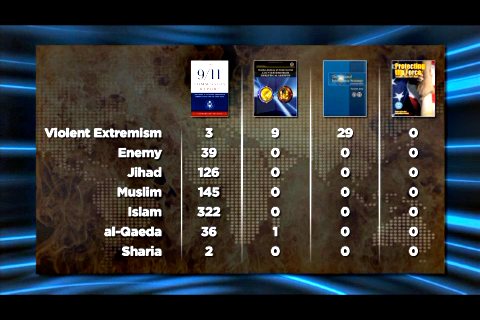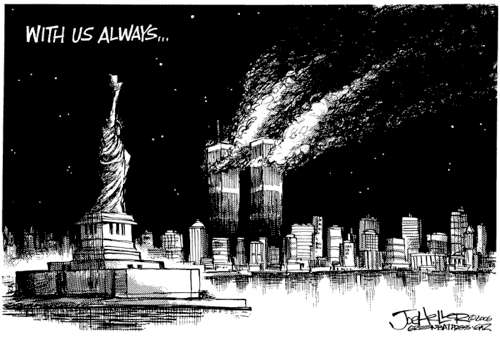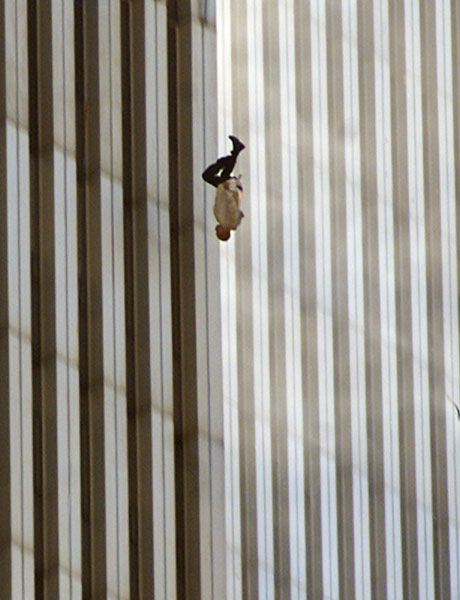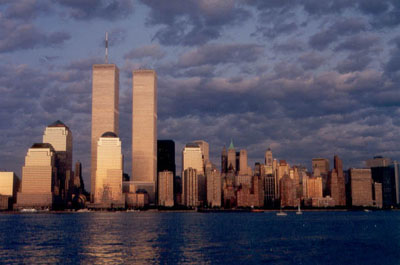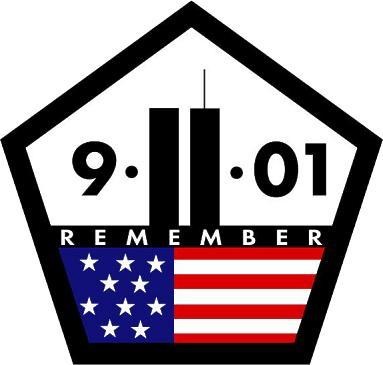Fourteen years later, I have nothing fundamentally new to add.
The horror of that day has long since been eclipsed in my mind by the consequent exposure of our own weakness, and our determined unwillingness to squarely confront the enemy that brought such horror to us, in the years since. Our appetite for self-deception and willfully naïve thinking far exceeds anything I’d have imagined. Our foundational institutions, from academia to journalism to entertainment and the arts to government and even our military, have been extensively compromised beyond likely repair by determined ideological termites whose goal of an ever-weaker America is now at hand. The realities of the day did not shake their belief systems, as I had once supposed an attack on our nation would. Nor has the steady litany of attacks in the years since — from London, to Madrid, to Beslan, to Bali, to Mumbai, to Kenya, to Paris, to Moscow, to the Fort Hood shooter, to the Beltway Snipers … the list goes on and on. Nor has the rise of ISIS, with all its attendant barbarity plainly on display for the whole world to see. ISIS operates with free reign because we — The United States in particular, and the West in general — lack the resolve and moral conviction to do anything substantial to stop them. We are now led by people deluded enough to believe that weakness is somehow strength, and that our implacable and barbaric enemies can be persuaded by olive branches and “Coexist” bumper-sticker platitudes. These are people who led us to abandon all gains in Iraq, with our intentions and timetable so clearly advertised that we might as well have hung out a “This territory up for grabs” sign. ISIS is expanding its reach virtually unchecked, and is successfully recruiting from Western populations, for God’s sake — because unlike us, they actually believe in themselves and what they are doing.
Soon, Iran — whose political and spiritual leaders have been unambiguous about their intentions toward Israel, the United States, and the West — will have nukes. They’ll have them because, gullible fools that we’ve become, we’ve effectively surrendered on that front too.
I’ve pleaded. I’ve striven to educate. As have many others, with much greater dedication and skill. At this point, those who can be awakened have been. Those who do not wish to see, won’t.
I’m weary of seeing things I don’t want to see, that few others are willing to see and acknowledge. I have no patience to stand by and watch a slow cultural suicide, nor do I especially want to spend years studying the mechanics of self-inflicted civilizational decline when there are far higher aspirations for this civilization of ours to reach. I have zero respect or patience for PC scolds and their demonstrably flawed multicultural platitudes, whose net effect ends up somewhere between naïve ignorance and willful sabotage. We, who have managed to welcome and happily “Coexist” with people of just about every other belief system in the world, have encountered an enemy that has been pretty clear about its lack of interest in “Coexist”-ing with us, and with our cultural foundations now compromised due to the willful actions of some among us, we are under-equipped to confront that reality and deal with it. We’re in grave danger of losing everything that matters, not because a handful of Jihadist scumbags attacked us on 9/11/2001, but because far too many among us are willing and eager to choose cultural surrender as an alternative to fighting and decisively defeating those rotten bastards.
It seems maybe, remotely possible that in the final, twilight years of this once great Civilization of ours, the lunatics who labored to institute such weakness might, as they finally start to notice things crumbling around them, look back and wonder whether they’d perhaps made a mistake or two — long, long after it’s far too late to do anything to turn the tide. I’m not holding my breath.
We’re a culture in serious need of a reboot, and I’ve turned my efforts to finding a way for that to happen — for some remnant of our indomitable spirit to have a chance to thrive again unhindered. Because in the end, mere physical survival and avoiding playing a part in the fulfillment of a Jihadi death wish for another day isn’t what it’s about. It’s the long-term survival of the essence of who we are that matters. And how that goes … is entirely up to us.
My Previous Years’ 9/11 Posts
2014: 9/11, Thirteen Years On
2013: 9/11, Twelve Years On
2012: 9/11, Eleven Years On
2011: A Plea, Ten Years After: Please, Open Your Eyes ~ Ten Years Later: 9/11 Links
2010: 9/11: Two Songs
2009: Tomorrow is 9/11 ~ My Experience of September 11, 2001 ~ 9/11 Quotes
2008: 9/11, Seven Years On ~ 9/11, Seven Years On, Part 2 ~ 102 Minutes that Changed America
2007: 9/11, Six Years On
2006: Soon, Time Again to Reflect ~ 9/11 Observances ~ 9/11 Observances, Part 2
2005: I Remember
2004: Remembering and Rebuilding (republished here September 12th, 2014)
Another 9/11 has rolled around. And while the grief and anger are still there, and we have renewed cause for concern this year in the rise of ISIS/ISIL, I find that my feelings seem not particularly more pronounced on this day relative to any other. The problems that we are obliged to squarely face endure, and are relevant every day of the year, not just on anniversaries of the September 11th, 2001 Jihadist attacks on the United States.
The sickening brutality of ISIS/ISIL and its ideological fellow travelers such as Boko Haram has been something for the world to behold. If we cannot now see with complete clarity what these scumbags are about, I don’t know what it will take. The fact of things as I see it is that ISIS/ISIL are but a particularly awful symptom, one that is enabled and allowed to exist only to the extent that we lack the resolve to call them what they are and commit ourselves unreservedly to their complete and unconditional defeat.
The broader, underlying problem we face is an erosion of cultural confidence, and I’m sad to say it’s the predictable result of decades of steady, dedicated work by many among us — people whose aim has been to demoralize us and gradually chisel away at the foundations of our belief in who we are and the way that we live. An event such as 9/11 should have brought us to our senses, it seems to me, and brought an end to that idle self-doubt, seemingly born of boredom with years of relative safety and security. But I’ve been proven more wrong in that expectation than in any other of my life. Rather than have a change of heart, our cultural termites dug in and continued their toil. It makes no sense to me to see a culture of great achievement, worthy of celebration and of a strident and confident defense, in such willful and sometimes self-recriminating denial about the threats posed to it. But there it is. It’s an aspect of human nature that I suspect I will continue to struggle to understand for many years to come.
I do feel I’ve made progress, though, in casting off the shadow of gloom this past year and a half or so. It feels as if my thinking has shifted to a point of: OK. So that’s how it is. What are you going to do about it?
Our present condition is not cause to sit in idle resignation. It’s cause to get up, dust ourselves off, and fix the things that matter. And despite all the potential reasons for gloom, I’m doing it with gratitude in my heart, a cheerful demeanor, and a smile on my face — because I’ve learned that no matter what, one cannot allow others to drive him to despair. To have hope of prevailing, we must maintain a steady and undaunted focus on all that is positive in our love for what we hold dear. We must make that love stronger, more resilient, and more lasting than our enemies’ bitterness, brutality, and hate. It’s what I’ve been striving to do, and aim to continue to do, with The No Fear Pioneer (so please give a listen, and stay tuned for more to come).
That’s it for now. As in previous years, I may follow up with some links and quotes later, as I read good work by others. Below are links to my previous years’ 9/11 posts, including the 2009 retelling of my own peripheral but deeply affecting experience of that awful day. As before, I pledge myself never to forget — nor misremember. May we find our way to better times.
My Previous Years’ 9/11 Posts
2013: 9/11, Twelve Years On
2012: 9/11, Eleven Years On
2011: A Plea, Ten Years After: Please, Open Your Eyes ~ Ten Years Later: 9/11 Links
2010: 9/11: Two Songs
2009: Tomorrow is 9/11 ~ My Experience of September 11, 2001 ~ 9/11 Quotes
2008: 9/11, Seven Years On ~ 9/11, Seven Years On, Part 2 ~ 102 Minutes that Changed America
2007: 9/11, Six Years On
2006: Soon, Time Again to Reflect ~ 9/11 Observances ~ 9/11 Observances, Part 2
2005: I Remember
2004: Remembering and Rebuilding (republished here September 12th, 2014)
In 2008, blogger “Zombie” published a thoughtful, well-reasoned post discussing the conditions for victory in Iraq, and calling for November 22nd to be observed as “Victory in Iraq Day”. Continued progress and relative stability over the three years since seems to me to have vindicated that judgment, and in line with what I wrote on the occasion that year, I think we ought to carry on the tradition. The U.S. and her allies achieved what many vehemently declared was impossible, ousting one of the world’s worst dictators, liberating the Iraqi people, and planting the seeds of freedom and representative democracy in what has been one of the most politically troubled and volatile regions of the globe. Today’s Iraq has its challenges and problems, to be sure, but it is a place far more full of genuine hope than it had been under two decades of Saddam’s brutal dictatorship, and stands as a stark and unflattering counterexample to the remaining dictatorships that surround it, have acted to undermine it, and feel their grip on power threatened by its very existence. Those are all things to be grateful for and to celebrate.
Even President Obama, who as a senator vigorously opposed what he declared to be an ill-motivated, ill-conceived, and unwinnable Iraq war, and as a candidate opportunistically vilified the war and the Bush administration, promising an immediate withdrawal of our troops if elected, no matter the consequences, has had to quietly concede that the U.S. won the very war he campaigned against. Once in office, and I suspect apprised of facts and perspective that only presidents and their military advisors have access to, he scrapped his promises of immediate and unconditional retreat and defeat to embrace the same overall policies and drawdown plan of the Bush administration that he previously demonized.
The Bush administration didn’t take it upon itself to declare victory, and it was clear that neither candidate Obama nor the press were about to do any such thing. It was up to others to do so, and I’m grateful to Zombie and the participants in 2008’s V-I Day for leading the way.

I’m not one to focus on the negative, but there is something I hope will not be forgotten about this war, that I fear history books will not amply record: the way that victory was achieved despite the most intense vilification of American conduct and motives that I have seen in my lifetime. The opposition brought their biggest rhetorical guns to bear, some among them stopping at nothing and accusing us of the most vile, malevolent intentions. We were charged by some with going to Iraq to steal their oil, to claim the land as a permanent colony of our vast, overbearing Empire, or simply for the implicit joy of killing dark-skinned people. There are people for whom it is a foregone conclusion that such actions are clearly and exactly what the United States is all about, for whom we are the exact polar opposite of all that we claim to stand for, because in order for those people to win hearts and minds it must be made to be so. The record of our actual conduct proved otherwise, casting our soldiers’ actions in start contrast with the brutality of foreign fighters who committed themselves to the failure of the Iraqi project at all costs, deliberately inflicting the kind of mass civilian casualties that the United States takes greater pains than any combatant in history to avoid. Sadly, history’s record will not prevent the same accusations from being endlessly recycled. We will fight identical smears again in future conflicts — I feel sure of it — and we had therefore best learn from this experience and be mentally prepared to battle the same calumnies again.
As I wrote on my recently added “Welcome” page, and meant it: I feel deeply, humbly grateful and indebted beyond capacity for adequate repayment to the men and women of the United States armed forces, and equally so to our truest friends in this world, the soldiers of our stalwart allied nations, who daily risk everything they have in this brief life for the liberty and safety of others, setting aside even their own. Let there be no doubt: I want them to have the full support that their risk and sacrifice merits, and I want them to be given every chance to succeed that they ask of us — precious little to expect, I think, in return. They have my sincerest admiration, and with remarkably few exceptions that serve to prove the rule, I am deeply, deeply proud of their demonstrated ethics, courage, fairness, generosity, resourcefulness, and professional conduct as our emissaries in hostile lands. The precious, fragile free society that we so often take for granted is the very thing they are risking all to preserve and defend, and they should have our heartfelt gratitude.
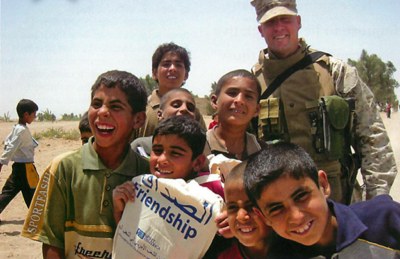
To those who risked all to make Iraq’s liberation possible, and to those who lost all making it happen, may you forever have the gratitude of the freer world you left behind. You are the best of us, in my book, and we are lucky to count you as our fellow citizens.
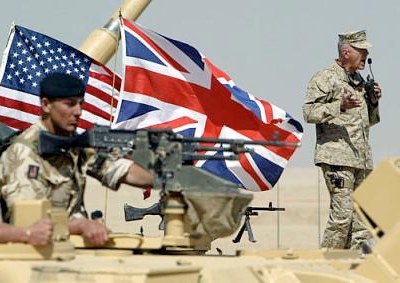
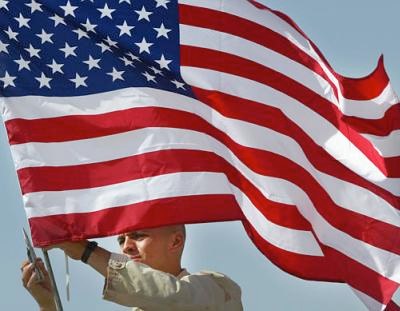
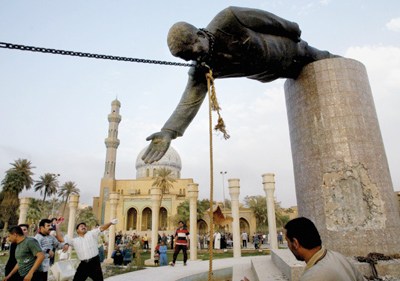
For additional perspective, see Bill Whittle’s September 2011 “What We Did Right,” which, among its survey of the decade since the 9/11 al Qaeda attacks, examines the results of our intervention in Iraq.
In past years, I’ve written about where I was on 9/11, posted quotes, written about songs, tweeted the names of victims, and recommended blog posts, articles, and videos. But on nearly every anniversary of the 9/11 al Qaeda attacks since I started blogging, the unifying issue on my mind has been nearly the same: To assess where we are and how we are faring some years after.
Reviewing what I’ve written in years past, I find that my answer to that question has changed very little, and the farther we get from that awful day the more that fact worries me, for despite having successfully thwarted at least 19 subsequent would-be attacks, I don’t think we’re faring very well as a culture, in crucial ways that for me raise serious questions about what our long-term future will hold.
I try not to let the gloom envelop me. In so many ways, I am an optimist in my heart of hearts. I have tremendous confidence in our culture and way of life, in our resilience and adaptability, and in all that we can achieve with our ingenuity and dedication and mutual goodwill. Yet it kills me to see that same culture mired in and hobbled by an unwarranted mentality of self-recrimination and self-doubt, and simultaneously unwilling to candidly examine and confront an ideological movement that is actively, deeply, vocally, immutably, and demonstratedly hostile to its foundational principles and continued existence.
What does it mean to live in a culture that is only just barely willing to stand up and fight for itself in the wake of a horrific act of war such as the 9/11 attacks? I would not have thought our present-day frame of mind possible to sustain after such an event, but the cultural and political divisions that predated 9/11 have proven far more resilient than I would ever have expected. We didn’t wake from our slumber of infighting to pursue, united and with doggedly committed determination, the defense and preservation our nation and way of life; rather, we retrenched and resumed fighting each other, our cultural fault lines painfully underscored in the process. As Michele Catalano wrote three years ago,
In so many ways, 9/11 ended up furthering any divisions we had instead of closing them. We chose up sides and backed away from each other as if we were our own enemies —- as if the enemies we had, those who steered planes into buildings, weren’t enough.
This realization, and the seeming impossibility of bridging the chasm, has been a knife in my heart ever since. It kills me. But I don’t see any way around it.
So many aspects of our cultural condition have caused me grief over the past ten years. I feel crestfallen that it is taking us as long as it has to rebuild at the World Trade Center site. I’ve felt deeply betrayed by a Hollywood that now routinely denigrates and vilifies the country whose values and achievements it once celebrated and defended, a Hollywood that I loved in my youth but have now all but written off and given up on. I have been deeply disappointed in a supposedly mainstream American press that seems to have seen it as its sworn duty to demoralize us and convince us of inevitable defeat and dishonor in the wars we’ve prosecuted, in a way that’s been shown to be transparently contingent on the political party of the President in the White House. I’m troubled that over the past three years, we’ve largely acted in ways that can only serve to embolden our enemies, while giving our friends and allies and those we should at least be lending moral support in their fight for freedom and against totalitarianism (c.f. Iran’s democracy activists, and other participants in the recent “Arab Spring” uprisings) scant reason to hope for the backing of a country that has for so long been thought of as a beacon of hope and the moral “leader of the free world”. It makes my heart sink that too many of our own citizens seem to believe that America is the problem in some form or other.
All of these cultural factors pain me and deeply trouble me, but on this 10th anniversary of the 9/11 attacks I’m willing to largely put them aside in the interest of getting just one, crucial point across regarding the single most dangerous problem we face: the inability or unwillingness to name, frankly discuss, and squarely face our ideological enemy. More than anything else, it is a commitment to reckoning with this circumstance that needs to cross the perhaps otherwise impassable ideological chasm that separates the American Right and Left.
We can and will continue to differ with our countrymen regarding specific policy prescriptions, including matters of war. I could perhaps accept that, in a world where I felt we had all made a candid and fully informed assessment of the adversary we are up against. But there are still many among us who don’t seem to want to look Islamic Supremacism in the face, or even acknowledge its existence, either because the prospect is too frightening, or because the acknowledgment would violate long-practiced “PC” rules of cultural conduct that are so deeply ingrained in us, we fear we wouldn’t know how to function without blindly deferring to them. If I could make one plea to my fellow countrymen, Left, Right, and Center, it would be this: Please, please look with open eyes at what we are up against. Even if you must conclude that Islamic Supremacism is a fringe ideology with no real possibility of gaining dominance or causing substantial long-term harm to the free world (I truly wish I could believe it was so), do so with a full understanding and awareness of what the Jihadists intend for us, far-fetched or not, as detailed in their own words and actions: the return of a 7th century Caliphate that is fundamentally incompatible with and hostile to secular and pluralistic free societies, with all the attendant implications for women, homosexuals, infidels and religious and ethnic minorities. These Jihadists have told us their intentions time and time again, but we somehow refuse to believe them.
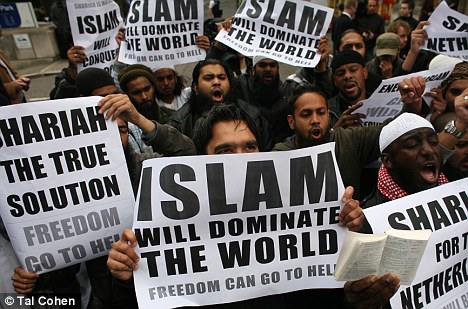
We are so conditioned to reflexively genuflect to any and every other culture as a show of goodwill, that both our critical thinking faculties, and our courage to overcome fear of social reprisals and voice our honest concerns, seem to have become disengaged or defunct. If every culture and religion in this world was as benign in its intentions toward us as most are, this willful blindness wouldn’t be a big problem. We could all live together in happy harmony and the “coexistence” that so many understandably wish for. But the fact that most others have relatively benign intentions has disarmed us to the crucial few that do not. Our cultural defenses are down — way down — and even being caught off our guard ten years ago with horrific consequences doesn’t seem to have changed that sufficiently. Informing and educating ourselves about what we’re up against is crucial, for we cannot expect to remain both ignorant and free.
Is this state of denial (or leaning strongly toward diplomatic use of language, if you prefer) causing any real problems? It certainly seems to be. How else could a man like Nidal Malik Hasan remain in active service in the United States Army, after repeatedly making statements against the United States and in sympathy with our Jihadist enemies? There are compelling and deeply troubling indications that not only our armed forces, but our broader defense and law enforcement agencies are compromised in their ability and sworn duty to protect this country and its citizens by pressure to whitewash reality, sanitize the use of language that could be perceived as hurtful or offensive, and shrink from confronting reality. We are letting organizations such as CAIR — a front for the Muslim Brotherhood, whose charter calls for a “grand jihad in eliminating and destroying the Western civilization from within and ‘sabotaging’ their miserable house by their hands and the hands of the believers so that it is eliminated and God’s religion is made victorious over all other religions” — advise our FBI on how to combat violent Islamic radicalism.
Bill Whittle’s April 7, 2010 PJTV piece “The Censorship Agenda” revealed in worrisome detail the sanitizing of our foundational national security documents that has taken place since the original, bipartisan 9/11 Commission Report. (As Bill himself suggests, contrary to the provocative subtitle “Obama Bans ‘Islam’”, the culture of self-censorship and willful blindness that produced these results may very well be indicative of a long-extant problem that predates the Obama administration.)
Think about the implications of Bill’s findings: in stark contrast with the comparatively frank and sober assessment of the 9/11 Commission Report (whose use of key terms is tabulated in the leftmost column, below), the FBI’s 2008 Counterterrorism Analytical Lexicon (next column), our 2009 National Intelligence Strategy report (next column), and the Protecting the Force: Lessons from Fort Hood report on the shooting rampage by Nidal Malik Hasan (rightmost column), use the terms “Islam”, “Muslim”, and “Jihad” a total of zero times.
Zero.
The National Intelligence Strategy report doesn’t even reference “al Qaeda” or use the word “enemy” (employing, instead, the term “violent extremist”, a total of 29 times). The DoD’s Fort Hood report, amazingly, makes no reference whatsoever to “violent extremism”, “Islam”, “Muslim”, “Jihad”, or even to Hasan’s name.
Think about this. Disregard, for the moment, our popular culture and variously informed conversation among Joes like you and me. How is it possible that the very institutions we charge with our defense — whose analyses one would expect, of necessity, to be unflinchingly sober and frank — have become this willfully blind?
I can only shake my head in near-despair at the self-sabotaging ridiculousness of it. It might be funny if the consequences weren’t so dire for all of us. (Bill, however, has a more upbeat outlook than I do this year.)
Forget about applying the non-lethal (but awfully emotionally insensitive) tool of humor by mocking our enemies, which appears to be completely out of the question save for a few valiant out-of-the-mainstream efforts such as Shire Network News and Sands of Passion. In most cases, we can’t even bring ourselves to precisely and candidly refer to them. If our thinking and definitions are clear, there should be no reason not to do so, given all that is at stake.
This man has the right idea (emphasis mine):
There is nothing insulting to decent, good members of the Muslim religion when I say “Islamic extremist terrorist”, any more than it is insulting to the Italian-American community (when I was a prosecutor) to say the word “Mafia”. Or that it would be insulting to decent Germans to say the word “Nazi”.
One mistake to avoid is political correctness. You can’t fight crime, and you can’t deter terrorism, if you are hobbled by political correctness. I believe that Major [Nidal] Hasan is an example of that. There is no way that Major Hasan should have been a major in the United States Army, after several years of spewing forth hatred for the United States of America… I would consider Major Hasan’s attack on Fort Hood an Islamic extremist terrorist attack. I have a hard time understanding why the government doesn’t see it that way, since he was yelling “Allahu Akbar” when he started killing people. …
… We cannot use this as an opportunity to say, “let’s put this behind us”, because if we we do that, we will repeat the mistake that we made before September 11th, which is not evaluating correctly the scope and the danger of Islamic extremist terrorism. Notice I use those words and I use them often. I do because I have a simple belief: If you can’t face your enemy, you can’t defeat your enemy. If you can’t honestly describe your enemy, there are distortions in your policy decisions as a result of that.
Re-read that last part, and internalize the essential lesson: If we refuse the accurate use of words, we are sabotaging ourselves.
Since accusations of “Islamophobia”, etc. are now flung automatically against any who express concern about Islam’s militant political arm as exemplified by the likes of al Qaeda and Hamas, let me be as clear as it’s possible to be, knowing full well that “it is impossible to speak in such a way that one cannot be misunderstood” (or willfully misinterpreted): I really don’t want to spend my time writing and thinking about this stuff. I have no intrinsic need to gratify myself or feel superior by grinding ideological axes against either an external enemy culture or my own countrymen. I’d much rather invest my time and energy inventing, innovating, creating, raising my son, spending time with my wife, living and working and striving to do better among peers whose origins span the globe, but who share a necessary basic dedication to the essential principles of a free society. I would love nothing more than to be decisively proven wrong about all of this, and get back to my life. I think and write about this kind of stuff because, as far as I can tell, there is no avoiding it. The very culture that furnishes and protects my ability and yours to live our lives as we do and freely engage in such humanity-advancing work, is under attack by another that demands our submission to a suffocating, stifling, totalitarian ideology. If we cannot name, discuss, and confront that ideology, we might as well surrender to it.
My “endgame” — the long-term future I hope for — is not a perpetual state of war (who would wish for that?), but a true coexistence of stable peace and security that can only exist after the Islamic Supremacist threat has been acknowledged and somehow neutralized. That is to say, I seek a peace worth having. To whatever extent we can accomplish that without resorting to the use of force and violence, wonderful — you have me on your side. I want and hope for a future where I can freely live, work, and prosper alongside all others who share my commitment to upholding the essential principles of our free society, Muslim and non-Muslim alike, regardless of where on the globe they hail from, without any of us having to fear violence from totalitarian nutjobs. There is too much to do and achieve for us to waste our time, capabilities, and resources on war where we have a reasonable alternative. But to shrink from the last-resort necessity of war when it is upon us seems to me no less a betrayal of the society we rightly cherish, for if left undefended that society will crumble.
I speak “peace”, when peace is spoken.
Even when we are not in our worst moments of genuflecting self-censorship, our choice of terminology has been clumsy, muddled, and unhelpful from the start — and, make no mistake, these poor choices of terminology sink us. Case in point: A “War on Terror” is no more meaningful than a “War on Blitzkrieg”, or a “War on Kamikaze strikes. Terror is a tactic, not an identification of the ideology that motivates its perpetrators. The ideology we’re up against is is most accurately described as “Islamic Supremacism” — a militant, political branch of Islam that sees as its imperative the subjugation under strict Islamic law (Sharia) of all non-Muslims and any who wish to live in free and pluralistic societies. To attempt to broaden our response to al Qaeda’s brand of violent Islamic Supremacism into a “War on Terror” is to dilute our sense of purpose, and pretend against evidence that there are just as many terrorists motivated by various other ideologies who pose an imminent threat. This awkwardly vague and clumsy choice of words was, I think, both an attempt to avoid any reference to or indictment of any sect of “Islam”, and a well-intentioned overture of comradeship to other nations who had suffered terrorist scourges of other origins, but in the end I believe it’s been an ill-advised one. Since we’re not supposed to draw any connection between acts of terrorism and even a small, extreme, ostensibly non-representative minority fringe of Islam, we try to make do with the unhelpfully vague “War on Terror”, and it’s a wonder if we don’t forget what, in fact, we are fighting against.
I’m out of words, but I hope I’ve made my point clearly.
Please, my friends. Before you decide this is not your fight, read, research, learn. Our shared future is at stake.
Recommended Watching
I’ve watched this memorial slideshow every year. It unfailingly moves me to tears. Never forget that day, nor misremember. Never forget those we lost, the heroes who ran unbidden toward danger and lost their lives saving others, the heroes aboard Flight 93 who lost theirs preventing another attack that would likely have killed scores more of their fellow citizens…
Inside 9/11: an in-depth accounting of the 9/11 attacks and the events that led up to them
102 Minutes that Changed America: a uniquely composed account of the attack on New York, seen through raw footage from a variety of sources, combined with emergency calls and radio communications
Recommended Reading
Of all the deeply moving posts, pages, and articles I’ve seen about 9/11, this one from 2009, comprised of stirring photos and an unflinching examination of the enemy and cultural crisis we face, is unforgettable and not to be missed: 9/11: Never Forget, Never Give In
I’ll also be posting links, separately over the next few days, to the best writing about 9/11 I encounter this year. Look for posts tagged “9/11”.
My Previous Years’ Posts
2009: Tomorrow is 9/11 ~ My Experience of September 11, 2001 ~ 9/11 Quotes
2008: 9/11, Seven Years On ~ 9/11, Seven Years On, Part 2 ~ 102 Minutes that Changed America
2007: 9/11, Six Years On
2006: Soon, Time Again to Reflect ~ 9/11 Observances ~ 9/11 Observances, Part 2
2005: I Remember
2004: Remembering and Rebuilding (Yes, that’s me, in a post at my old blog. I’ll be transitioning to blogging openly under my own name here shortly. It’s about time.) Republished here, September 12th, 2014.






